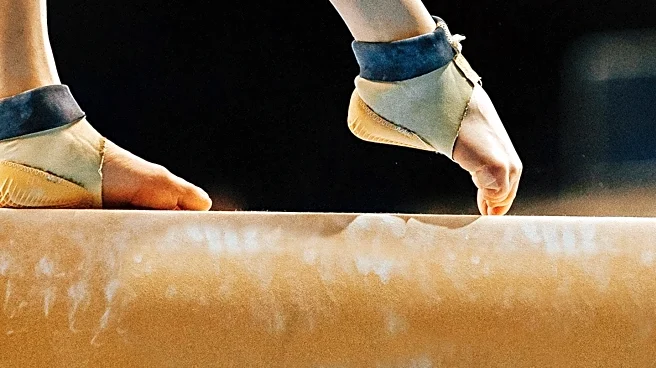What's Happening?
A gymnastics coach's suggestion to enroll a young girl in a more advanced class has sparked concerns about the financial and emotional implications for her family. The mother, initially proud of her daughter's
talent, faced a dilemma when the cost of the advanced class nearly doubled the previous expenses. The situation became more challenging when her husband lost his job, forcing them to withdraw their daughter from the program. Despite her daughter's evident talent, the family struggled with the financial burden and the time commitment required for competitive gymnastics. The mother contemplated the long-term benefits versus the immediate costs, considering alternative ways to support her daughter's development without the pressure of competitive sports.
Why It's Important?
This story highlights the broader issue of the financial and emotional strain that competitive sports can place on families. Many parents invest significant resources in their children's extracurricular activities, hoping for potential scholarships or professional opportunities. However, the reality is that only a few athletes receive full scholarships, and the subjective nature of sports like gymnastics can make these opportunities even more elusive. The story underscores the need for families to weigh the costs and benefits of such commitments, considering the potential impact on family dynamics and the child's overall well-being. It also raises questions about the societal pressure to excel in sports at a young age and the importance of preserving childhood experiences.
What's Next?
The family decided to withdraw their daughter from the competitive gymnastics track, opting for a more balanced approach that allows her to enjoy the sport without the intense pressure. This decision reflects a growing trend among parents to prioritize their children's overall happiness and family time over the pursuit of competitive success. As more families face similar dilemmas, there may be increased demand for recreational sports programs that focus on skill development and enjoyment rather than competition. This shift could lead to changes in how sports programs are structured and marketed, potentially influencing the broader culture of youth sports.
Beyond the Headlines
The story also touches on the cultural expectations surrounding youth sports and the pressure to specialize early. It raises ethical questions about the commercialization of children's activities and the role of coaches and sports organizations in promoting a balanced approach. The family's experience may resonate with others who feel caught between supporting their child's interests and managing practical constraints. This narrative could contribute to a broader conversation about redefining success in youth sports and encouraging diverse experiences that foster personal growth and family connections.








